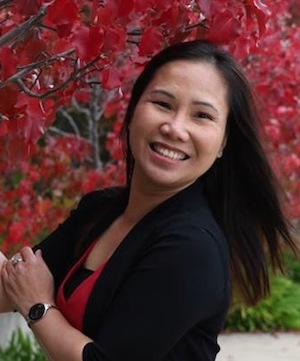 Trinh Thi Tam
Trinh Thi Tam
Minister Counselor & Deputy Chief of Mission
Embassy of the Socialist Republic of Viet Nam in Canberra
Public Policy Program (’03)
Please tell us about your career path so far. What is your area of specialization and how did you come to work in this area?
Diplomatic service and foreign affairs are my current areas of specialization. I can say that I came to work in this area by a very good chance: After graduating from Hue University in 1994, I went to Ha Noi, the capital of Viet Nam, with a strong desire to get a job in a foreign company just to find afterward I was admitted to the Ministry of Foreign Affairs (MOFA), after a challenging entrance exam. My first intention was to work there for a short time and then try to find another opportunity to join a foreign company, but as you see, I fell in love with MOFA since the first working days and have been faithful to it since then.
Please tell us about your career in the Ministry of Foreign Affairs thus far.
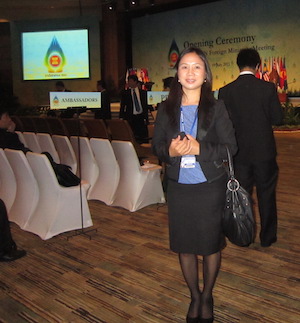
Accompanying Viet Nam Foreign Minister at the ASEAN Ministerial Meetng in Bali, July 2011
I started in MOFA in late 1994 as a country desk-officer in the Department of Southeast Asia-South Asia and South Pacific with almost no knowledge and experience in diplomacy and foreign affairs. Everything was quite new for me, but I – in my early 20s – was full of energy and enthusiasm to make a fresh start, even though I was facing many difficulties living far from my family and hometown. I was luckily provided with several short training courses, both in Ha Noi and overseas, but I mostly learnt and accumulated experience on-job from senior colleagues.
The nature of my job is to take care of bilateral relations between Viet Nam with countries in the Southeast Asia, South Asia and South Pacific region, ranging from political to economic, defense, cultural, and education areas. I was moved around in the Department, having a chance to deal with more than 20 countries in the region, so I gradually “grew up” in my career. I was appointed Head of different Sections in the Department until I enrolled in the Masters of Public Policy Program at GRIPS in October 2002.
In 2005, I was posted to the Embassy of Viet Nam in the Republic of Korea for a term of 3 years; after that, I returned to my previous Department and in 2010 I was appointed the Deputy Director General. I worked in the same Department until I was posted to Australia in 2014 as Minister Counselor-Deputy Chief of Mission (DCM) of the Embassy of Viet Nam in Canberra.
You are currently Minister-Counselor and Deputy Chief of Mission of the Embassy of Viet Nam in Australia. What are your main duties and responsibilities?
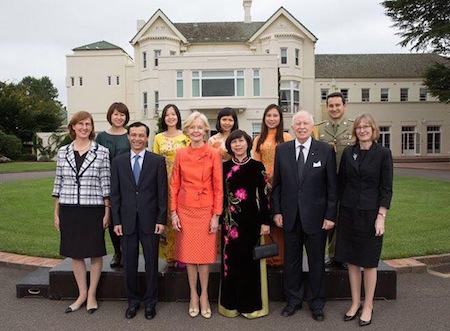
With current Ambassador Luong Thanh Nghi at the credential presentation ceremony in Canberra, May 2014
I have often joked that as Minister Counselor – Deputy Chief of Mission (DCM), I have to take care of what the Ambassador will not do. In fact, my responsibilities and duties are comprehensive and diversified, ranging from foreign affairs to internal affairs. As for “foreign affairs”, the key purpose of the Embassy is to strengthen and develop Viet Nam-Australia bilateral relations in all areas. Meeting, discussion, negotiation, event organization, report making… are common skills that I have to use. It has always been interesting to meet with Australian people from various circles and brainstorm on what can make the cooperation between Viet Nam and Australia getting better and better.
As for “internal affairs”, I have to manage issues related to Embassy staff members, administration, logistics and consular affairs. In this regard, it looks like looking after a baby. All the time, I have some tiny things to take care of, which requires patience, carefulness and a devoted heart. But it is always my pleasure and happiness to see any of my policy or measure makes my colleagues satisfied.
As a DCM and female diplomat, I also take part in several circles, such as Canberra DCM group, which consists of DCMs of the Embassies in Canberra, and Women International Community, which includes international women in Canberra. These circles, with their diversified activities, are really supporting my diplomatic service during my posting.
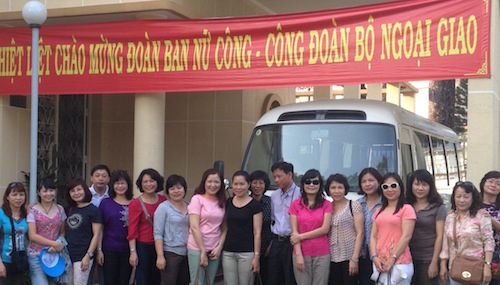
Informal exchange with female colleagues working in the diplomatic service
What are some of the biggest challenges you face in your work?
Much travelling; and living overseas, far from my parents are two biggest challenges that I often find in my work.
Working as a diplomat means I have to travel very often to different countries in the region and in the world for meetings, conferences, seminars, negotiations or signing ceremonies. I also have to travel to localities in Viet Nam. Those trips help me to broaden my knowledge, experience and vision, but at the same time, I have to sacrifice time I should have spent with my small family. Jet lag, local food, time strain… are also common problems for me in working trips.
In addition, a diplomat has to be posted to work in Viet Nam representative offices overseas. Usually one term lasts 3 years, and if I cannot arrange (i.e., spouse’s job, children’s schooling…), I may have to go overseas alone. I am lucky to have my son with me during my posting in Korea (my husband was not there because he could not arrange his work), and to have all of my small family here (even a new born “made in Australia”!) during my posting in Canberra.
What have been the most interesting or rewarding aspects of your career thus far?
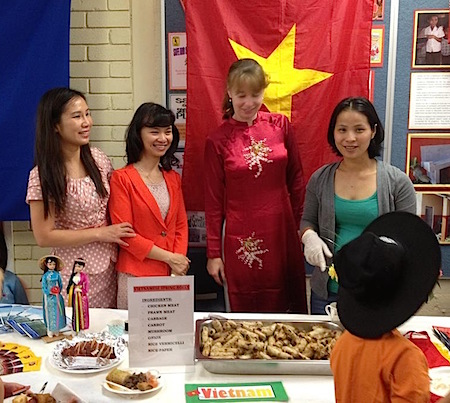
Introducing Vietnamese spring rolls to international community in Canberra, June 2015
As a diplomat, I feel rewarded whenever witnessing good things in Viet Nam’s relations with countries that I am in charge of. For instance, when I tasted the first Vietnamese lychees imported to Australia after 12 years of hard negotiation, it was both a burst of my tears and laughter.
What do you see as the main (diplomatic or otherwise) challenges and opportunities for Viet Nam over the course of the next five to ten years?
Viet Nam pursues an independent and self-reliant foreign policy, which has brought about various opportunities for Viet Nam to expand external relations, both bilaterally and multilaterally. Over the next 5 or ten years, given the rapid regional and international integration, Viet Nam can enjoy more chances to enter new markets and promote export, and at the same time, attract more investment and ODA for its socio-economic development. In addition, Viet Nam’s ongoing active participation in different multilateral organizations such as the UN, APEC, ASEAN, ASEM, ARF, EAS etc. will further strengthen and elevate its prestige and role, especially in dealing with such matters of mutual concerns as terrorism, climate change, territorial disputes, people smuggling…, making Viet Nam a reliable and responsible partner in the region and the world as well.
However, like other countries, Viet Nam has been facing a number of challenges emerged from tensions and chaotic situations in some regions, including the Asia-Pacific itself. Terrorism, territorial disputes, climate change, trans-border crimes etc. have become inceasingly prominent and spreading, and can make the world or a region change overnight if not well managed and controlled. Viet Nam’s foreign policy is always aimed at peace, stability, cooperation and development, so we support all peaceful measures and solutions for regional and international disputes, under the principles of respect for each other’s independence, sovereignty and territorial integrity, non-interference in each other’s affairs; and non-use or threat of force. With that in mind, diplomats like me are confident to work for better relations between Viet Nam and other countries in the region and the world, including Australia.
What led you to GRIPS? What is the most important thing you got out of your studies here, and how has your experience at GRIPS prepared you for future endeavours?
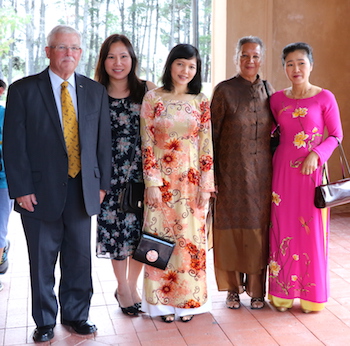
Meeting with UNSW Emeritus Professor Carl Thayer and spouse, March 2015
I was led to GRIPS by my strong desire of getting higher education and my love for Japan and the Japanese. As I mentioned earlier, I was not trained in diplomacy and foreign affairs, so I was very determined to equip myself with knowledge in these areas as well as management at the soonest. At the time I applied for my scholarship – Viet Nam was offered scholarships from various advanced countries – but I kept applying for those granted by the Japanese Government, and eventually I was successful.
In GRIPS, I enrolled in the Public Policy Program, which I found quite suitable for my career. I was provided with diversified courses, ranging from micro/macro economics, international politics, diplomacy, to policy making process in different areas…, which helped me to broaden my knowledge. The program was very intensive, and I always had to rush against time. But I was lucky to always have enthusiastic support and invaluable advice from GRIPS professors (whom we used to call sensei in Japanese) and GRIPS staff whenever I was in difficulty. In Japan, I learnt the admirable characters of the Japanese (hard-work, patience, self-discipline, resilience…).
I always treasure the time I stayed and studied in Japan and GRIPS. Though it was just for one year, the value and the value added I got from GRIPS and Japan have been so prevailing in my life and current career. Especially, the friendship with classmates from various countries, and with GRIPS professors and staff has always remained fresh in my heart. I really wish to have a chance to bring my children to Odaiba and Shinjuku to introduce them to the places where I used to stay and study.
What is your fondest memory of your time spent at GRIPS?
I have many good memories of GRIPS and Japan, so it is really difficult for me to indicate which is the fondest one.
But I really remember the time we went to Okinawa for a field trip. The trip was so special because it was the first time our class could go out together to a distant place and for a long time (except for the excursion to the snowy village of Shirakawa-go). Okinawa’s culture is so unique, a mixture of Asian countries where each of us could find some traits of our people. We explored and learnt with much fun there. I still remember the musical instruments and local costumes that we were allowed to try. I was also impressed by the giant Okinawa Aquarium, local food and friendly gestures of the local people.
What do you miss about Viet Nam and how do you like living in Canberra?
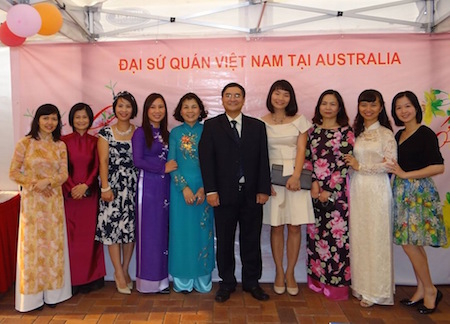
With the then Vietnamese Ambassador Hoang Vinh Thanh welcoming Vietnamse people at the Lunar New Year reception in Canberra, January 2014
This time my oversea stay is not too bad as I find myself privileged that my small family is here with me. And I am also lucky to have a cute newborn. In addition, we have a big Vietnamese community of around 250.000 people here, so I can easily find ingredients for my Vietnamese dishes (not so difficult as in Tokyo!). What I really miss about Viet Nam is my big family, my parents, my friends, my colleagues, Ha Noi, and my home town – Hue.
Canberra (sometimes I joke by spelling it as “CAN- BORING”) is really a worthy place to live and work, at least for the middle-aged like me. It is quiet, well-organized and self-disciplined. Especially, the traffic is quite relaxing (compared to Ha Noi and capitals of ASEAN countries)!
You have three young children, the youngest just a few months old. How do you maintain the balance between work and your family and the rest of your life? What is your favorite thing to do when you are not working?
I used to have a lot of hobbies for my leisure time, but since I got the newborn, all I do after working hours is taking care of her. It may be a favorite thing most of the time, but not ALWAYS!
To keep the balance, that is really a challenge, but I have tried so far with certain success (I can say that because I am still “alive” with work and family!). Really I do have to run against time in almost everything. The word that is probably repeated again and again in my head is “be quick, be quick”, and my frequent dream is to have a proper sleep every night (which has not yet come true!).
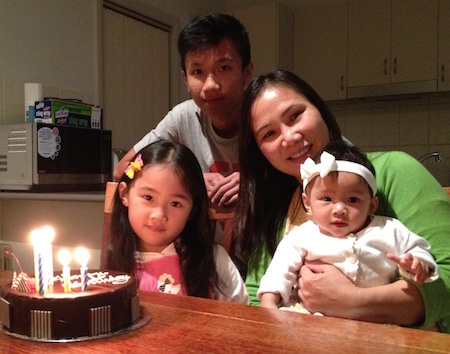
Busy mom of 3 children of 15 years, 6 years and 8 months old.
Taking care of children requires much time, patience and sacrifice. In Viet Nam, I can have a nanny (it is very easy to get one at reasonable price), but in Canberra it is almost impossible because it is expensive while the procedures for bringing a nanny from Viet Nam to Australia take time and money too. I have to wake up early and stay up night, but I am satisfied if I can fulfill the long list of the office and house tasks of the day, and reward myself a rest of several hours before another day starts.
Of course, my husband is a big help. He is the baby-sitter whenever I am at work or away for my diplomatic activities. But for the weekend, I will be happy to be the baby-sitter, and let him freely go out, meet friends and play golf. So you see, I almost have no time for myself now. Hopefully, when I come back to Viet Nam, my parents can help me and I will have a chance to do my favorite things. Now in Canberra, I just focus on work and my small family.
If you could give one piece of advice to anyone considering studying at GRIPS what would it be?
I have one regret after I left GRIPS and Japan, that is the fact that I did not learn Japanese properly, though I was provided with very good opportunities. So, my advice is that if you consider studying in Japan and in GRIPS, please also consider taking up Japanese.
Do you have any suggestions on how to further utilize the GRIPS alumni network?
The current alumni network is working well, and I really appreciate it. It has enabled me to connect with my friends and GRIPS staff, as well as be informed of GRIPS activities.
Personally, I think that if the network can be streamlined to smaller chapters of alumni’s particular areas of specialization (finance, education, tourism, diplomacy…), it will be more effective for alumni of the same work areas to exchange experience and information as well as help each other in work.




